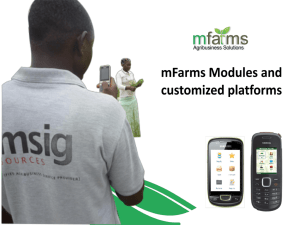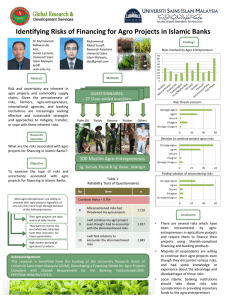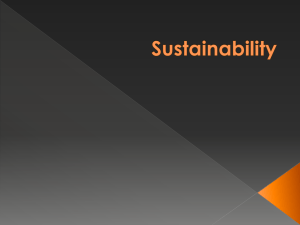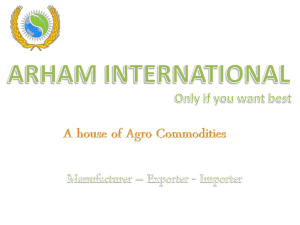e. resource allocation - Punjab Agro Industries Corporation Limited
advertisement
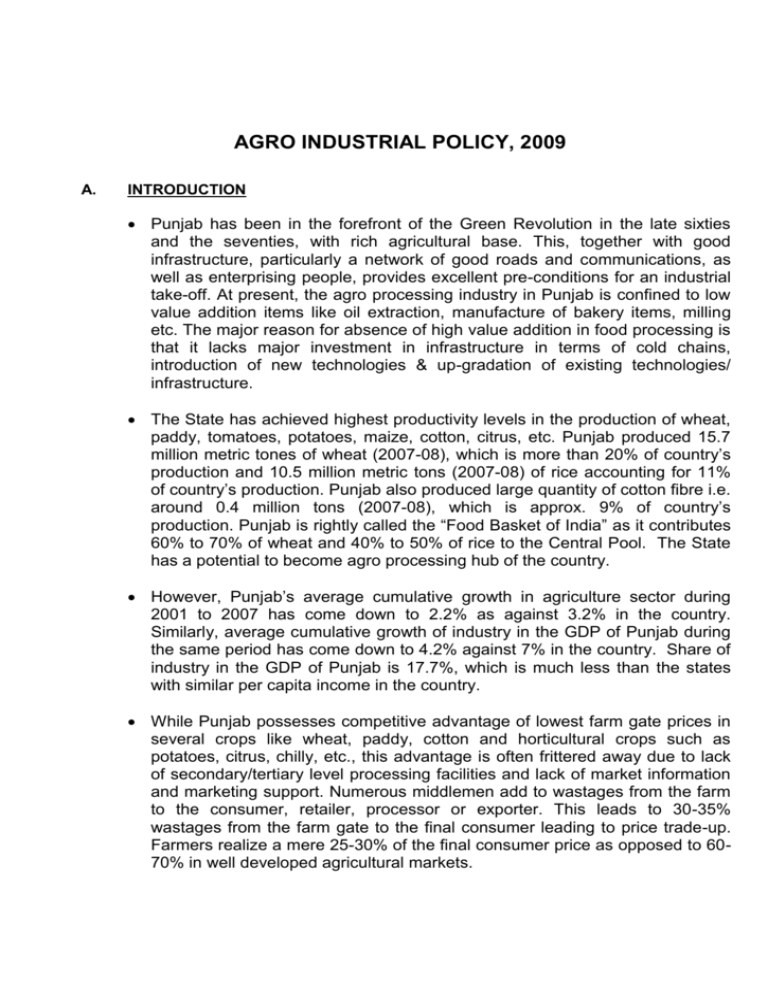
AGRO INDUSTRIAL POLICY, 2009 A. INTRODUCTION Punjab has been in the forefront of the Green Revolution in the late sixties and the seventies, with rich agricultural base. This, together with good infrastructure, particularly a network of good roads and communications, as well as enterprising people, provides excellent pre-conditions for an industrial take-off. At present, the agro processing industry in Punjab is confined to low value addition items like oil extraction, manufacture of bakery items, milling etc. The major reason for absence of high value addition in food processing is that it lacks major investment in infrastructure in terms of cold chains, introduction of new technologies & up-gradation of existing technologies/ infrastructure. The State has achieved highest productivity levels in the production of wheat, paddy, tomatoes, potatoes, maize, cotton, citrus, etc. Punjab produced 15.7 million metric tones of wheat (2007-08), which is more than 20% of country’s production and 10.5 million metric tons (2007-08) of rice accounting for 11% of country’s production. Punjab also produced large quantity of cotton fibre i.e. around 0.4 million tons (2007-08), which is approx. 9% of country’s production. Punjab is rightly called the “Food Basket of India” as it contributes 60% to 70% of wheat and 40% to 50% of rice to the Central Pool. The State has a potential to become agro processing hub of the country. However, Punjab’s average cumulative growth in agriculture sector during 2001 to 2007 has come down to 2.2% as against 3.2% in the country. Similarly, average cumulative growth of industry in the GDP of Punjab during the same period has come down to 4.2% against 7% in the country. Share of industry in the GDP of Punjab is 17.7%, which is much less than the states with similar per capita income in the country. While Punjab possesses competitive advantage of lowest farm gate prices in several crops like wheat, paddy, cotton and horticultural crops such as potatoes, citrus, chilly, etc., this advantage is often frittered away due to lack of secondary/tertiary level processing facilities and lack of market information and marketing support. Numerous middlemen add to wastages from the farm to the consumer, retailer, processor or exporter. This leads to 30-35% wastages from the farm gate to the final consumer leading to price trade-up. Farmers realize a mere 25-30% of the final consumer price as opposed to 6070% in well developed agricultural markets. It is necessary that the agro industrial sector delivers adequate return on invested capital by operating throughout the year by integration of industry with the agro farms. A twin pronged strategy of improving agricultural yields coupled with delivering the right quality at a competitive price to different markets would be necessary while renewing efforts towards ongoing diversification. The agro industry needs to concentrate on primary, secondary and tertiary processing leading to higher levels of value addition for better returns. Centres for Agri & Food Processing technologies would be set up to develop technologies suitable to local produce and to meet quality and safety standards for exports. To develop human resources for the Agro & Food Processing Industries, specific courses with contents to meet the industry requirements would be introduced at all suitable levels in relevant institutes. Industry would have direct interface with the centers for development of technologies and the institutes providing courses in Agro/Food Processing sectors. The incentives provided under the Industrial Policy 2003, taxation structure and infrastructure requirements to boost investment in agriculture sector were discussed with the various stakeholders in the industry viz. their associations namely CII, FICCI, PHD Chamber of Commerce and Progressive Farmers, etc. The suggestions so received were considered for inclusion in the New Agro Industrial Policy. B. OBJECTIVES This policy endeavors to make Punjab, the destination of choice for investors and processors, both global and domestic. Punjab has vast untapped potential in agro industrial sector, which could be used advantageously to achieve multiple goals viz. increased income for farmers, rural industrialization, employment generation, better quality products to consumers. This can be achieved by new investments in agro industries by national/multinational companies. The broad objectives of agro industrial policy are as under: To increase flow of investments in agriculture and agro industries so as to establish backward and forward linkages. To accelerate a close interface between research, extension mechanisms, industry, farmers, markets and consumers. To increase value addition thereby increasing income of farmers, traders and delivering better quality products to consumers. To create modern supply-chain infrastructure needed for agro industrial development and marketing of agri produce. To create employment opportunities, thus, improving quality of life. To assist small-scale agro based units to remain competitive in a globalized market. To increase export of fruit & vegetables and value added agri products. C. DEFINITIONS 'Agro Industry' means units which add value to agricultural produce, intermediates and/or residues by processing or by improving storability or by providing link from farm to the market or part thereof. Other categories of units, products and processes as may be notified by Government from time to time, would also be eligible. D. INCENTIVES 1. Interest Subsidy to Agro Industrial Units Agro processing is a high risk industry. It is in its nascent stage of development in the Punjab. Agro industrial units pay heavy interest on term loan impacting their competitiveness & sustainability. In order to assist agro industrial units during the initial period of operations, interest subsidy will be granted on term loan taken from Scheduled/ Nationalized Banks/Financial Institutions, which fall under the purview of the Reserve Bank of India. 5% back ended subsidy for 5 years on the interest on term loan subject to a ceiling of Rs.20 lacs per year per unit i.e. maximum of Rs. 100 lacs in five years, will be provided subject to the conditions specified. Interest subsidy will be available to agro industrial units making fixed capital investment ranging from Rs.10 crores to less than Rs.25 crores and availing term loan upto Rs. 15 crores. The cost of land for the computation of fixed capital investment will not be more than 20% of fixed capital investment. 2. Interest Subsidy to Agri Infrastructure Projects Over the years, area under fruits & vegetables is increasing and to keep this momentum there is a need to create agri/cool chain infrastructure in the private sector. At present, modern cool chain infrastructure is virtually missing in the State. The Govt. is determined to bring private investment in this area by extending back ended interest subsidy scheme to units, which create agri infrastructure viz. integrated cold chain which includes pack houses, ripening chambers, washing/cleaning/grading lines, controlled atmosphere chambers, high humidity cold stores and refrigerated vans. The interest subsidy will be granted towards interest on term loan taken from Scheduled/Nationalized Banks/Financial Institutions, which fall under the purview of the Reserve Bank of India. 5% back ended subsidy for 5 years on the interest on term loan subject to a ceiling of Rs. 20 lacs per year per unit i.e. maximum of Rs. 100 lacs in five years will be provided subject to the conditions specified. Interest subsidy will be available to agri infrastructure projects making fixed capital investment ranging from Rs.5 crores to less than Rs.25 crores and availing term loan upto Rs. 15 crores. The cost of land for the computation of fixed capital investment will not be more than 20% of fixed capital investment. 3. Interest Subsidy to Small/Medium Agro Modernisation and Technology Upgradation Industrial Units for The State Govt. would encourage existing small/medium agro industrial units to undertake modernization and/or technology upgradation to meet the challenges of marketing. Interest subsidy would be granted to units availing term loan from scheduled/nationalized Banks/FIs, which fall under the purview of the Reserve Bank of India. 5% back ended subsidy for 5 years on the interest on term loan subject to a ceiling of Rs.20 lacs per year per unit i.e. maximum of Rs. 100 lacs in five years, will be provided subject to the conditions specified. Interest subsidy will be available to existing small/medium agro industrial units undertaking modernization and/or technology upgradation for installing new equipments and availing term loan upto Rs. 5 crores for the purpose. 4. Following conditions will also be applicable on the schemes mentioned above (Para 1 to 3) The back-ended interest subsidy will be provided after the unit has commenced commercial operations. The interest subsidy will be sent directly to the Banks/FIs. Interest subsidy will be available where the unit has not defaulted in repayment of principal and interest thereon. 5. Assistance for Setting Up Centre of Excellence for Development of Technologies in the area of Agro / Food Processing Industry The State Govt. intends to set up centres of excellence on PPP model to develop appropriate food processing/processing technologies (suitable to Punjab crops). Besides development of such technologies, the centres would also provide training/vocational courses to youth at all levels in agro processing, product development, pilot plant, incubation and food safety. The centres would be provided financial assistance upto 25% of the fixed capital investment, subject to a ceiling of Rs. 2.50 crores. The State Govt. will participate in PPP project on terms and conditions as decided by the Govt. 6. Assistance for International Food Standards/ Global Gap Certification In order to improve food quality & food safety at all levels of operations from farm to fork, assistance for obtaining International Food Standards/Global Gap Certification will be provided to the extent of 50% of actual expenditure subject to a ceiling of Rs.1 lac to producers of fruits & vegetables. 7. Assistance for Preparation of Detailed Project Reports To enable implementation of agro industrial units in a scientific manner, the Govt. will provide financial assistance to the extent of 50% of the cost of preparation of Detailed Project Report subject to a ceiling of Rs. 5 lacs. The amount of assistance will be reimbursed only after the project is commissioned. 8. Assistance for Patent Registration For patent registration of new products relating to agro industries & agriculture, assistance of 50% will be provided, subject to a ceiling of Rs.2 lac per patent. The financial assistance will be made after the patent has been registered. E. RESOURCE ALLOCATION The financial obligation to provide subsidy/assistance under para ‘D’ computes to Rs.530 lacs in year 1, Rs.1030 lacs in year 2, Rs.1330 lacs in year 3, Rs.1230 lacs in year 4, Rs.1530 lacs in year 5, Rs.1200 lacs in year 6, Rs.900 lacs in year 7, Rs.600 lacs in year 8 and Rs.300 lacs in year 9. Yearwise summary of the financial obligation is as under: (Rs. in Lacs) Years Agro Industry – Interest Subsidy Agri Infrastructure Interest Subsidy Modernisation/ Technology Upgradation Interest Subsidy Centre of Excellence Assistance IFS/ GAP Assistance Detailed Project Report Assistance Patent Registration Assistance Total: 1 100 2 200 3 300 4 400 5 500 6 400 7 8 9 Total 300 200 100 2500 100 200 300 400 500 400 300 200 100 2500 100 200 300 400 500 400 300 200 100 2500 200 400 400 - - - - - - 1000 10 10 10 10 10 - - - - 50 10 10 10 10 10 - - - - 50 10 10 10 10 10 - - - - 50 900 600 300 8650 530 1030 1330 1230 1530 1200 The total financial obligation for nine years is Rs.86.50 crores. It is proposed that the funds may be provided from the Rural Development Fund. F. SUBSIDY ON DOMESTIC MARKETING & EXPORT OF FLOWERS, FRUITS & VEGETABLES AND IMPORT OF PLANTING MATERIAL PAGREXCO has been providing subsidies for distant domestic marketing and exports of flowers, fruits & vegetables to the growers. Now, the subsidies will be provided at the rates mentioned below: Domestic Distant Marketing (500 kms. away from Punjab Border) Subsidy on Waxing/Grading 50% of the cost of waxing/grading of kinnow. (currently also at 50%). Subsidy on Pre-cooling-cum-Cold Storage 50% of the cost of pre-cooling & cold storage on fruits & vegetables. (currently also at 50%). Subsidy on Packing Material 25% of the cost of non-wooden packing material for all fruits & vegetables. (currently at 15%). Subsidy on Freight 25% of the inland cost of freight for all fruits & vegetables. (currently at 15%). Subsidy on inland reefer 25% of the inland freight cost of frozen fruits & vegetables (other than peas). (currently also at 25%). Export of flowers, fruits & vegetables Subsidy on Packing Material 30% of the cost of non-wooden packing material for flowers, fruits & vegetables including frozen, processed and de-hydrated products. (currently at 25%). Subsidy on in-land Freight 30% of in-land reefer cost of freight upto airport and/or sea port for flowers, fruits & vegetables including frozen, processed and de-hydrated products. (currently at 25%). Subsidy on Air-Freight for partial load 30% of air freight, subject to a maximum of Rs. 10/- per kg. for Asian countries and 25/- per kg. for other countries for flowers, fruits & vegetables including frozen, processed and de-hydrated products. (currently at 25%). Subsidy on Air-Freight for full load 50% of air freight, subject to a maximum of Rs. 20/- per kg. for flowers, fruits & vegetables including frozen, processed and de-hydrated products. (currently also at 50%). Subsidy on Sea-Freight 30% of sea freight cost, subject to a maximum of Rs. 10/- per kg. for Asian countries and 25/- per kg. for other countries for flowers, fruits & vegetables including frozen, processed and de-hydrated products. (currently at 25%). Subsidy on import of seed & planting material for Horticultural crops. Subsidy @ 50% of the landed cost in India including cost of planting material & freight (currently also at 50%). (Subsidy under para F will be provided from the Corpus Fund being maintained by PAGREXCO) G. OTHER CONCESSIONS The concession regarding exemption of market fees on wheat given in the Department of Agriculture notification No. G.S.R. 96/P.A.23/61 /S.43/ Amd. (58)/2001, dated 11.09.2001 shall be retained. All agro processing units will be allowed to purchase agricultural products directly from the farmers and necessary exemption for this purpose will be given to them under the Punjab APMC Act. CLU/EDC CHARGES To provide incentives to new agro industrial units, CLU charges for conversion of agricultural land to agro industrial land would be waived off. Similarly, EDC charges for this specific purpose would also be reviewed. REVAMPING OF TAXES, VAT & DUTIES, RDF, MDF, ID CESS It shall be the endavour of the State Govt. to rationalize taxes like VAT and other duties viz. VAT, RDF, MDF and Infrastructure Development Cess etc. on agricultural produce in the interest of promotion of agro industries. GENERAL CONDITIONS The interest subsidy will not be applicable to units engaged in wheat flour mills, rice sheller, cotton ginning/pressing mills, sugar mills, oil expelling & solvent extraction units, distilleries, breweries and potato cold stores. Interest subsidy will be available on original amount of loan. Penal interest or compound interest shall not be taken into calculation. The unit with whom any taxes or any other Govt. dues are outstanding, the unit/industrial entrepreneur will not be eligible for any benefit under this policy. If the unit has availed interest subsidy or other financial assistance under any other scheme of State Govt./Govt. of India then similar benefits under this policy will not be available. The interest subsidy will be available to eligible units on First–come-FirstServed basis. The application, forms and related documents for this policy will be devised by PAIC. All matters of interpretation under this Policy will be referred to the Punjab Govt. (Agriculture Department) whose decision shall be final.

